We may not have the course you’re looking for. If you enquire or give us a call on 01344203999 and speak to our training experts, we may still be able to help with your training requirements.
Training Outcomes Within Your Budget!
We ensure quality, budget-alignment, and timely delivery by our expert instructors.
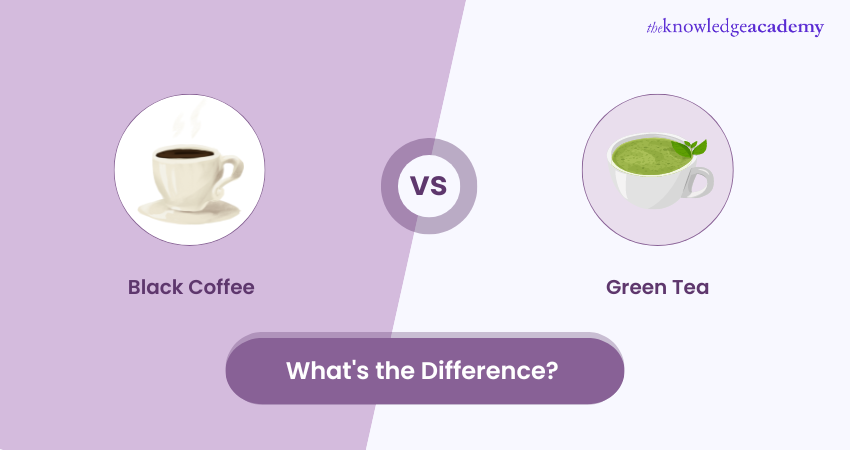
Have you ever wondered if your daily cup of Black Coffee or Green Tea is good for your health? Many of us have heard doctors and dieticians say that we should exclude tea and coffee from our diets. But what if we told you that both Black Coffee and Green Tea can actually benefit you? In the ongoing debate of Black Coffee vs Green Tea, both beverages are known for their beneficial qualities, making them excellent options for fitness enthusiasts.
As far as history goes, Black Coffee and Green Tea have been praised for their health benefits. According to Statista, tea is the most frequently consumed beverage worldwide after water, while coffee is equally popular. So, how do you decide which one is better for your health? How can you differentiate between Black Coffee and Green Tea?
Explore this blog on Black Coffee vs Green Tea to discover a detailed comparison between these two popular beverages. Learn about the key benefits each one offers and make an informed choice for maintaining a healthier lifestyle.
Table of Contents
1) Introduction to Black Coffee
2) Introduction to Green Tea
3) Green Tea vs Black Coffee
a) Black Coffee vs Green Tea: Caffeine Content
b) Black Coffee vs Green Tea: Acidity
c) Black Coffee vs Green Tea: Taste
d) Black Coffee vs Green Tea: Health Benefits
4) Black Coffee and Green Tea Brewing Tips
5) Black Coffee vs Green Tea for Weight Loss
6) Conclusion
Introduction to Black Coffee
Black Coffee is simply coffee with nothing added—no cream, milk, or sweetener. By skipping these extras, you avoid the calories, fat, and sugar that come with them. This allows you to enjoy the health benefits of coffee without the additives.
Consider this: An 8-ounce Starbucks Caramel Macchiato contains 120 calories, 15 grams of sugar, and 4 grams of fat. In contrast, the same amount of brewed Black Coffee has just 2 calories, no sugar, and no fat.
Additionally, Black Coffee offers another minor health benefit. Without dilution from cream or sugar, you receive the antioxidants and caffeine at full strength. These components are believed to provide most of coffee's health benefits. However, you would need to add a significant amount of cream or sugar to noticeably reduce these benefits.
And what about coffee made from dark-roasted beans? It might seem logical that the darker the coffee, the greater the health benefits. Dark roast coffee has a richer appearance and fuller-bodied flavour compared to light or blonde roasts. However, whether dark roast coffee is better for you is still up for debate. For now, it largely comes down to personal preference.
Introduction to Green Tea
Green Tea is one of the least oxidized types of tea, made from young tea leaves plucked towards the end of the harvest season after the production of white, oolong, and Black Teas. Originally from China, Green Tea is now widely produced in many tea-growing regions, including Japan, India, Taiwan, Kenya, and Sri Lanka.
Orthodox Green Tea offers a variety of fragrances and flavours. This ranges from cooked vegetables and charred greens to grass, nuts, and citrus. These variations arise from slight changes in the processing methods, which impact the chemical and aromatic composition of the tea.
Green Tea is popular in the world due to its potential health benefits. It helps in weight loss and prevent cardiovascular diseases and certain types of cancer. Extensive studies have not yet fully substantiated these benefits. However, preliminary research has shown a positive correlation between regular Green Tea consumption and good health. Additionally, Green Tea has less caffeine content than coffee and most other teas, making it a healthy and safe beverage choice.
Green Tea vs Black Coffee
After you have read about Black Coffee and Green Tea, it's time to start the tussle: Black Coffee vs Green Tea. Many of us know that both Black Coffee and Green Tea have medicinal value. But it is essential to know which one you should consume. So, let's compare these beverages in detail.
Black Coffee vs Green Tea: Caffeine Content
Caffeine is the most widely consumed stimulant worldwide, naturally found in coffee and tea. These beverages are often the primary sources of caffeine in a person's diet. Coffee contains significantly more caffeine than Green Tea. An 8-ounce (240 mL) serving of coffee provides approximately 96 mg of caffeine. Meanwhile, the same amount of Green Tea contains much less.
According to the U.S. Food and Drug Administration (FDA), up to 400 mg of caffeine per day is considered safe for adults. That is around four or five cups of coffee. However, the recommended limit drops to 100 mg per day for teenagers and 2.5 mg/kg per day for children. Caffeine has numerous beneficial health effects, which include:
1) Increased energy levels, alertness, attention, and wakefulness
2) Reduced mental and physical fatigue
3) Quicker reaction times and improved accuracy
4) Enhanced exercise performance
5) Improved memory and mood
Caffeine has protective effects on brain health, potentially reducing the risk of dementia and other degenerative diseases. Some studies have linked caffeine intake with a lowered risk of developing type 2 diabetes, although research in this area is inconclusive and suggests caffeine may actually increase blood sugar levels in some cases. Below is a table that explains this in detail.
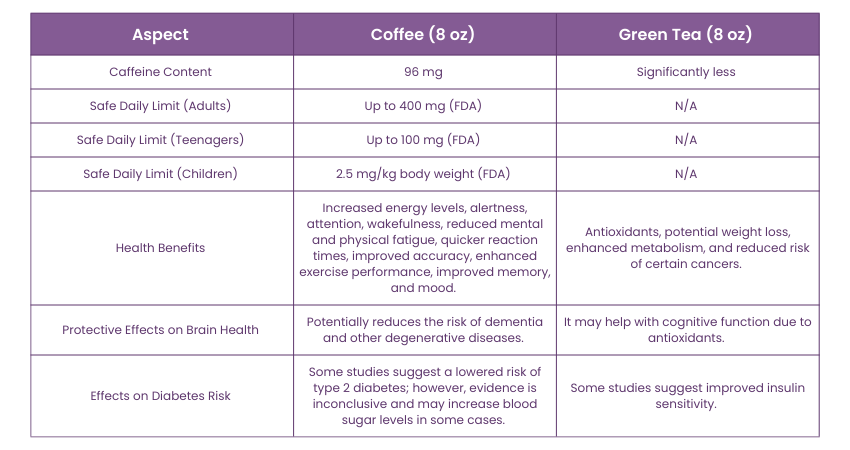
Black Coffee vs Green Tea: Acidity
Let's now talk about the difference in the acidic nature of Black Coffee and Green Tea:
Acidity in Coffee
Coffee is known for its distinct acidic taste, primarily due to various acids in the beans, including chlorogenic, quinic, citric, and malic acids. These acids vary based on the coffee bean variety, roast level, and brewing method. Light roast coffee generally has higher acidity than dark roast coffee.
1) Chlorogenic Acid: Most abundant in both green and roasted coffee beans.
2) Quinic Acid: Contributes to the sourness of brewed coffee.
3) Citric Acid: Adds a citrusy flavour, more common in light roasts.
4) Malic Acid: It imparts a fruity taste, which is more prevalent in light roasts.
Effects: High acidity can cause acid reflux and heartburn in some individuals. However, acids like chlorogenic acid have antioxidant properties and may reduce blood pressure. It's important to choose coffee that matches your tolerance and health needs.
Acidity in Tea
Tea's unique taste and aroma are partly due to its acidity. The pH level of tea varies based on the type, brewing method, and other factors. Common acids in tea include oxalic, malic, and citric acids.
1) Oxalic Acid: Found in high amounts in Black Tea; excessive consumption can cause kidney stones.
2) Malic Acid: Present in Green Tea, contributing to its tart taste.
3) Citric Acid: Found in all types of tea, providing a refreshing taste.
Effects: Acidity in tea aids digestion, boosts metabolism, and prevents harmful bacteria growth. Antioxidants in tea reduce inflammation and protect against chronic diseases. Excessive consumption can cause acid reflux, heartburn, and tooth enamel erosion. Less acidic teas like Green or Herbal Tea are recommended for those with sensitive stomachs.
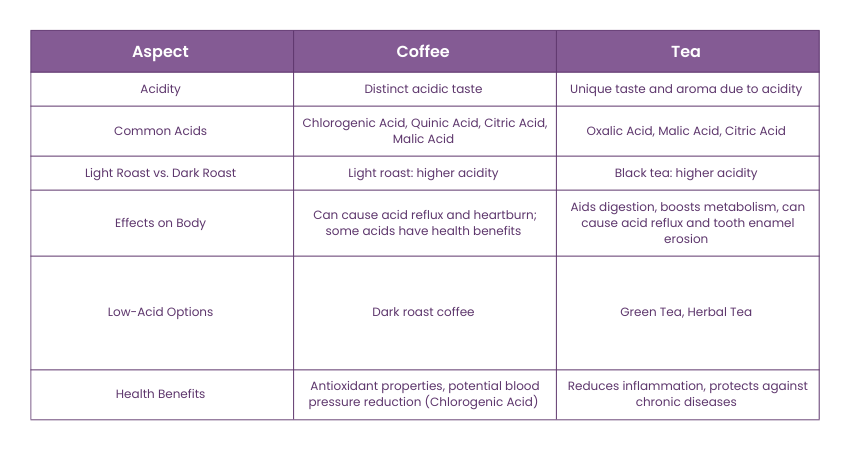
Black Coffee vs Green Tea: Taste
Black Coffee
Black Coffee is known for its robust and complex flavour profile. The taste of Black Coffee can vary widely depending on several factors, including the type of coffee bean, the roast level, and the brewing method used. Generally, the taste of Black Coffee is described as:
1) Bold and Strong: Black Coffee has a strong, bold taste, often with a slightly bitter edge.
2) Acidity: The acidity in coffee gives it a sharp, bright flavour. Light roasts tend to be more acidic with fruity or floral notes, while dark roasts have a more subdued acidity with deeper, richer flavours.
3) Bitterness: The bitterness of Black Coffee can vary but is usually more pronounced in dark roasts.
4) Aromatic Complexity: Depending on the bean origin and roast, Black Coffee can have notes of chocolate, nuts, spices, or even floral and fruity undertones.
Green Tea
Green Tea offers a more delicate and nuanced flavour compared to Black Coffee. The taste of Green Tea can also vary based on factors such as the type of tea leaves, the region where they are grown, and the processing method. Typically, Green Tea is described as:
1) Mild and Refreshing: Green Tea has a mild, refreshing taste with a light body.
2) Grassy and Herbal: Many types of Green Tea have a grassy or herbal flavour, often with a hint of sweetness.
3) Bitterness: Properly brewed Green Tea has minimal bitterness. However, oversteeping can result in a bitter taste.
4) Umami: High-quality Green Tea, especially Japanese varieties like matcha, can have a rich umami flavour, which is a savoury taste.
Both Black Coffee and Green Tea offer distinct taste experiences. The choice between them depends on personal taste preferences and the desired flavour profile.
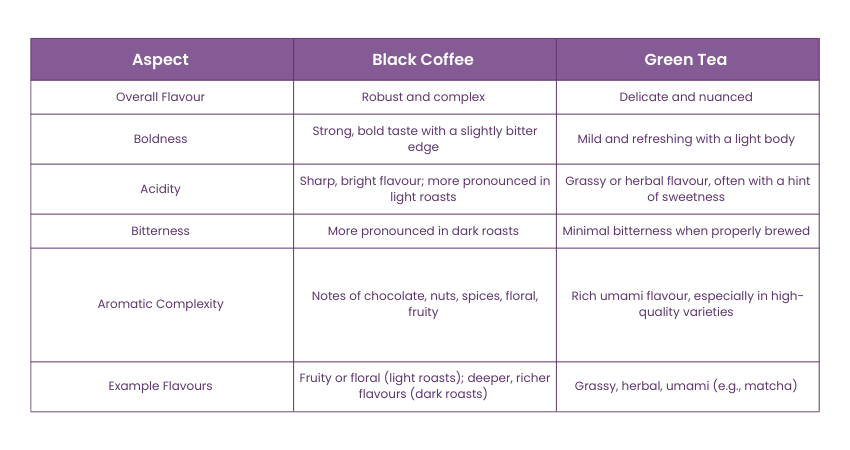
Black Coffee vs Green Tea: Health Benefits
Green Tea and coffee are both excellent sources of antioxidants, which play a crucial role in combating oxidative stress caused by free radicals. While free radicals have some beneficial roles in the body, their excess can lead to oxidative stress, potentially causing disease and accelerating the ageing process.
Fortunately, both beverages are rich in polyphenols, a group of antioxidants responsible for many of their health benefits and distinct flavours. The most abundant polyphenols in Green Tea and coffee are epigallocatechin gallate (EGCG) and chlorogenic acid (CGA), respectively.
EGCG in Green Tea: EGCG may inhibit tumour growth, prevent the spread of cancer cells, and induce tumour cell death. It also has anti-inflammatory properties that could help prevent chronic inflammation, a known factor in cancer development. Studies indicate EGCG may be particularly effective against head and neck, lung, prostate, breast, colorectal, and pancreatic cancers.
CGA in Coffee: CGA may also inhibit tumour growth and promote cancer cell death. It has shown potential benefits against liver, endometrial, and skin cancers. Additionally, CGA can benefit heart health and blood sugar control by regulating blood triglyceride levels and improving cellular response to insulin.
Both Green Tea and coffee offer various health benefits due to their high antioxidant content, particularly polyphenols like EGCG and CGA. These compounds may help reduce the risk of various cancers and support overall health by combating oxidative stress and inflammation. Incorporating these beverages into your diet could contribute to improved health and well-being.
Understand the art of colour coordination with our Floristry Introduction Course today!
Black Coffee and Green Tea Brewing Tips
Brewing the perfect cup of Black Coffee or Green Tea requires attention to detail and a bit of experimentation. Here are some tips to help you get the best flavour and benefits from these beverages.
Black Coffee Brewing Tips
1) Choose Quality Beans: Start with high-quality, freshly roasted coffee beans. The flavour and aroma of your coffee largely depend on the quality of the beans you use.
2) Grind Fresh: Grind your coffee beans just before brewing to preserve their flavour. The grind size should match your brewing method. For example, use a coarse grind for a French press and a fine grind for espresso.
3) Use Clean Water: Always use clean, filtered water to avoid any impurities that could affect the taste of your coffee. The ideal water temperature for brewing coffee is between 195°F and 205°F (90°C to 96°C).
4) Measure Accurately: Use the right coffee-to-water ratio. A standard ratio is about 1 to 2 tablespoons of coffee per 6 ounces of water, but you can adjust this to suit your taste.
5) Brewing Methods: Once you’ve chosen your preferred type of ground coffee, there are several brewing methods, which are mentioned below. You can choose it according to your preferences:
a) Pour-over or Drip: Hot water is poured over ground coffee in a paper filter.
b) French Press: Ground coffee steeps in hot water, then a plunger separates the grounds.
c) Percolator: Coffee and water are boiled in a two-chamber pot.
d) Coffee Pods: These are used in machines like Keurig or Nespresso.
e) Instant Coffee: Coffee crystals mixed with water.
f) Iced Coffee: Brewed coffee chilled and served over ice.
g) Cold Brew: Coffee steeped in cold water in the fridge overnight.
6) Serve Fresh: Drink your coffee immediately after brewing to enjoy its full flavour and aroma. Avoid letting it sit too long, as this can lead to a stale taste.
Green Tea Brewing Tips
Making Green Tea is simple and requires just a few steps:
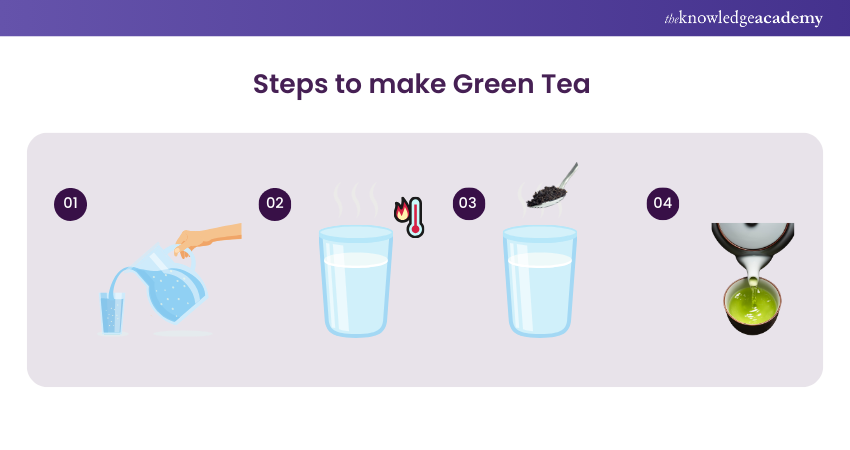
1) Boil Water: Start by boiling water. The ideal temperature for Green Tea is between 160°F and 180°F (70°C to 80°C). Boiling water can scorch the delicate leaves, so it's best to let the water cool slightly after boiling.
2) Steep the Leaves: Place Green Tea leaves in a teapot or a cup. Pour the hot water over the leaves and let them steep for 2-3 minutes. Steeping time can vary depending on the specific type of Green Tea and your taste preference. The longer you steep, the stronger the flavour and the more nutrients and antioxidants are released.
3) Watch the Colour: As the leaves steep, you'll notice the water gradually taking on a light green to yellow colour. This indicates that the tea is infusing properly.
4) Serve: Once the tea has reached your desired strength and colour, pour it into a cup through a strainer to remove the leaves. Your hot, nutrient-rich Green Tea is now ready to be enjoyed.
Black Coffee vs Green Tea for Weight Loss
Many people consider Black Coffee and Green Tea as part of their weight loss programme. Let’s discuss how much they help lose weight below.
Black Coffee
Black Coffee can help in weight loss primarily due to its caffeine content. Caffeine is a well-known stimulant that can boost metabolic rate and increase fat oxidation. Here are some key points about Black Coffee and weight loss:
1) Metabolic Boost: Caffeine can increase your metabolic rate, helping you burn more calories even when at rest. Studies have shown that caffeine can boost metabolic rate by 3-11%.
2) Appetite Suppression: Caffeine can also help suppress appetite, making you feel less hungry and reducing your overall calorie intake.
3) Thermogenesis: Caffeine stimulates thermogenesis, a process where your body generates heat and energy from digesting food, thereby burning more calories.
Green Tea
Green Tea contains both caffeine and catechins, particularly Epigallocatechin Gallate (EGCG), which work together to enhance fat burning and boost metabolism:
1) Catechins: EGCG in Green Tea can help boost metabolism and increase fat oxidation. Studies have shown that Green Tea extract can increase fat burning, especially during exercise.
2) Thermogenesis: Like Black Coffee, Green Tea can also enhance thermogenesis, promoting greater calorie burn.
3) Appetite Control: Some studies suggest that Green Tea can help control appetite and reduce calorie intake.
Comparing the Two
1) Calorie Content: Both Black Coffee and Green Tea are low in calories when consumed without added sugars or creamers, making them excellent choices for weight loss.
2) Caffeine Content: Black Coffee contains more caffeine than Green Tea, which might make it more effective for an immediate metabolic boost. However, this also means it may not be suitable for those sensitive to caffeine.
3) Additional Benefits: Green Tea has the added benefit of catechins like EGCG, which not only aid in weight loss but also provide powerful antioxidant properties.
Both Black Coffee and Green Tea can help in a weight loss regimen. They can boost metabolism, promote fat burning, and suppress appetite. Your choice might depend on your caffeine tolerance and preference for additional health benefits from antioxidants. Integrating either beverage into a balanced diet and active lifestyle can contribute to achieving weight loss goals.
Conclusion
The debate of Black Coffee vs Green Tea is not new to anyone. We hope the information provided in the blog has helped you end this prolonged debate. Black Coffee and Green Tea both have advantages but still differ from each other in a variety of ways. Lastly, you must choose between Black Coffee and Green Tea.
Enhance career opportunities in the hospitality and café industry with our Industry Training now!
Frequently Asked Questions

Green Tea and Black Coffee both have unique benefits. Green Tea, rich in catechins like EGCG, offers antioxidant and metabolic benefits, while Black Coffee, high in caffeine, boosts metabolism and energy levels. Effectiveness depends on personal health goals and caffeine tolerance. Both can aid in weight loss and overall health.

Green Tea’s catechins and caffeine enhance fat oxidation and thermogenesis, while Black Coffee's high caffeine content boosts metabolism and fat burning. Studies suggest Green Tea may have a slight edge due to its antioxidant properties, but both are effective for fat loss when combined with exercise.

The Knowledge Academy takes global learning to new heights, offering over 30,000 online courses across 490+ locations in 220 countries. This expansive reach ensures accessibility and convenience for learners worldwide.
Alongside our diverse Online Course Catalogue, encompassing 17 major categories, we go the extra mile by providing a plethora of free educational Online Resources like News updates, Blogs, videos, webinars, and interview questions. Tailoring learning experiences further, professionals can maximise value with customisable Course Bundles of TKA.

The Knowledge Academy’s Knowledge Pass, a prepaid voucher, adds another layer of flexibility, allowing course bookings over a 12-month period. Join us on a journey where education knows no bounds.

The Knowledge Academy offers various Industry Courses, including a Basic Barista Course, Facilitation Skills Training, and Floristry Introduction. These courses cater to different skill levels, providing comprehensive insights into Health Benefits of Drinking Black Coffee.
Our Business Skills Blogs cover a range of topics related to Coffee, offering valuable resources, best practices, and industry insights. Whether you are a beginner or looking to advance your skills as a Barista, The Knowledge Academy's diverse courses and informative blogs have you covered.
Upcoming Business Skills Resources Batches & Dates
Date
 Basic Barista Course
Basic Barista Course
Fri 21st Feb 2025
Fri 25th Apr 2025
Fri 20th Jun 2025
Fri 29th Aug 2025
Fri 31st Oct 2025
Fri 19th Dec 2025







 Top Rated Course
Top Rated Course



 If you wish to make any changes to your course, please
If you wish to make any changes to your course, please


